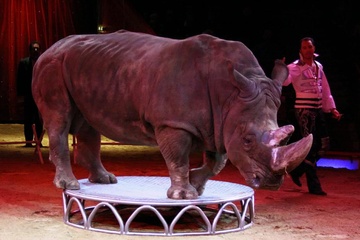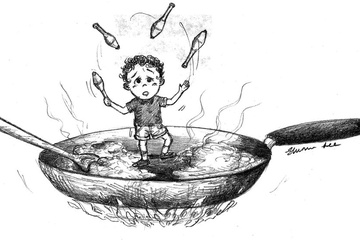skag heaven
Squirrelbait
Homestead Records
I T SEEMS LIKE AGES AGO, BUT in reality it has been less than three years since Husker Du was regarded as the loudest, grungiest, most health-hazardous band in the land. It the meantime, the Minnesota trio has taken off to a major label, college popularity and musical mediocrity. But now there emerges a new contender for the ramshackle throne abdicated by Bob Mould et alia, a contender going by the name of Squirrelbait.
Although this Louisville quintet has existed since 1982 and released an eponymous debut in 1985, it is on skag heaven that Squirrelbait make their best claim to sovereignty. Basically, this disk features four-chord power rock played with an abandon utterly lacking in most AOR music. It doesn't matter what material Squirrelbait chooses--from an original composition sensitively entitled "Black Light Poster Child" to a cover of Phil Ochs' "Road Tape From California"-- every song on skag comes out rough and tumble.
The best song here is "Kid Dynamite," which I take to be the band's big statement. "Kid" showcases the hoarse but usually melodic singing of Peter Searcy, who could replace Paul Westerberg of the Replacements in a pinch. The twin guitars here are turned up so loud that, even though the chords are relatively straightforward, a whole host of wonderfully accidental noises are created. Also featured are Squirrelbait's homey and near illiterate lyrics, culminating in the heartfelt chorus; "I don't need no pig stomping on my buzz."
The rest of the album continues in much the same vein, with occasional diversions into pseudo-blues on "Slake Train Comin" and Ramones-style hard-core on "Kick The Kat." Squirrelbait's chief appeal lies in their dissemblage of traditional rock music through volume and intensity, where (if you care to think about it) Husker Du's original and only appeal also lay. In fact, despite an atrocious sense of grammar and punctuation, Squirrelbait is better than their precursor because their sound is not burdened with the Husker's tendency towards artistic pretension and lyrical sappiness.
So all of you out there who are belatedly purchasing Zen Arcade or other Husker Du albums, might want to take heed. Sample skag heaven by Squirrelbait and catch a new trend in the making.
The Ice Machine
Breaking Circus
Homestead Records
HOW MANY GREAT BANDS HAVE to come from a particular region before it qualifies as a genuine musical scene? 100? 10? If the answer is three, then the scene of American music right now is Chicago. The exploits of two groups from the Windy City, Big Black and Naked Raygun, have been chronicled in these and other pages. And now, under the tutelage of Big Black's producer Ian Burgess, Breaking Circus joins the aforementioned to form a genuine, scene-making triumvirate.
The material on the second Breaking Circus album, The Ice Machine, is less jarring than Big Black and more atmospheric than Naked Raygun, but the group still throws a powerful, if somewhat subtle punch. On "Song Of The South," Steve Bjorklund's guitar twists around the recited vocals, alternately merging with and remaining distant from the words. Initially, Breaking Circus almost sounds minimalist: one can hear area of silence between the guitar and the industrial beat of the rhythm section. Ice starts to crank up, though, with the desperation and fury of "Laid So Low" and a total sound begins to congeal.
In this way, the album gains momentum. From "Took A Hammering" to "Evil Last Night," this disc progresses like a slow spiral into psychosis. However, like the best of Big Black and Naked Raygun, Ice is also triumphant and redemptive in the sheer force with which its pessimistic sentiments are lamented. If ever there were a good argument for the benefits of primal scream therapy, this trio of Chicago bands is it.
It should be admitted here that Breaking Circus also get points for humor, including liner notes presented in the form of a drinking game on the insert. The Ice Machine, however, is no joke. It is a true album, as distinguished from a lengthy and usually expensive collection of potential hit singles. Along with Big Black and Naked Raygun, Breaking Circus may cause a mass migration to the Midwest.





